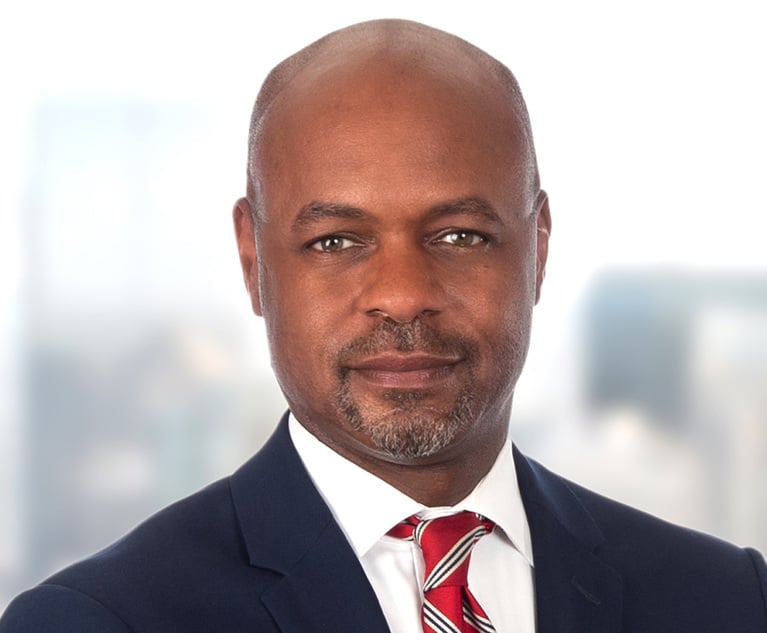Litigators With New Solo Shops Say COVID-19 Pandemic Hasn't Shut Them Down
Asbestos plaintiffs lawyer Sharon Zinns, commercial litigator Cody Wigington and regulatory and appellate law specialist Kurt Kastorf have kept their practices going, even though the courts are closed.
April 20, 2020 at 02:28 PM
7 minute read
 Kurt Kastorf Sharon Zinns and Cody Wigington. (Courtesy photos)
Kurt Kastorf Sharon Zinns and Cody Wigington. (Courtesy photos)
The Daily Report checked in with three litigators who've recently started their own firms to see how their new ventures are faring amid office and court shutdowns from the novel coronavirus pandemic. All three, asbestos plaintiffs lawyer Sharon Zinns, commercial litigator Cody Wigington and regulatory and appellate law specialist Kurt Kastorf, said they've got plenty to do, even though the courts are closed.
Zinns Law
Plaintiffs trial lawyer Sharon Zinns launched Zinns Law, specializing in mesothelioma cases from asbestos exposure, on April 6 in the midst of the pandemic.
"It was the worst timing of all time, but I'd already set this in motion," said Zinns, formerly a principal at a big plaintiffs firm, Beasley Allen. "People asked me if I was going to back out, and I said no. I took a chance on myself for better or worse—and so here we are for worse. It can only get better, right?"
Zinns has spent almost 15 years handling asbestos exposure cases, including the recent surge of talc cases, after graduating from Emory University Law School in 2005. She's one of only two Georgia lawyers who focus exclusively on mesothelioma cases. The other is Rob Buck of Buck Law Firm in Peachtree Corners.
Even though courts are closed, said Zinns, who brought cases with her from Beasley Allen, she's been busy with appellate briefs, preparing existing cases and vetting new ones. She expects to conduct video depositions, too. "My clients are dying. Their depositions can't wait," she said.
Zinns said she's accepted several new clients with mesothelioma-talc claims to join the multidistrict litigation in New Jersey against Johnson & Johnson, and she's got another case in Savannah for the family of a man who died of mesothelioma after installing floor tiles with asbestos for Sears.
Zinns started an asbestos practice for Beasley Allen two years ago after a decade working for New York plaintiffs firm Levy Konigsberg, which specializes in mesothelioma cases. She said she left the 80-lawyer plaintiffs firm on good terms and will continue using them as co-counsel on cases.
"I've always worked for someone else, and the longer you work for other people, the more you see what overhead means," said Zinns, who made partner at Beasley Allen last year. "Once you become a dyed-in-the-wool plaintiffs lawyer, you realize that real success comes when your name is on the door."
To finance her venture, Zinns has secured a line of credit to cover case expenses. For big cases, such as talc-mesothelioma matters, she's partnering with other firms, as she did at Beasley Allen. "They know my skill set and experience," she said.
"I'm going to owe a lot of money on a line of credit—but I believe in myself. It's a risk I'm going to take," she added.
Working from home has not been an issue for Zinns, because it was her plan all along. She said she doesn't need an office, because her clients are all over the country so she goes to them.
As a single mom by choice, said Zinns, who has a 2-year-old daughter, she also wanted her own shop for more flexibility in her time and work. "I can skip the getting dressed and going to work part, so I can spend more time with my daughter," she said.
Wigington Law
Cody Wigington left Baker & Hostetler to start his own commercial litigation boutique, Wigington Law, at the end of January. He said the court shutdown has not put a dent in his practice so far, since he's advising companies in business disputes, not handling personal injury cases.
"The nature of the matters I handle lends itself to people calling me earlier. They don't want to have to go to court," Wigington said. "In a situation like COVID-19, there is a ton of uncertainty, so it generates that type of work."
His work, if anything, has increased, Wigington said. "My clients have a lot of questions about potential disputes that could arise," as a result of the shutdown, he explained. "They want to head them off at the pass."
Wigington is handling cases on both the plaintiffs and defense side, as well as regulatory enforcement defense, for companies in real estate, construction, staffing, fleet management and transportation, all in Georgia federal and state courts.
He said he brought some clients with him from Baker & Hostetler and is landing new ones on referral from former colleagues and friends at big firms for matters too small for those firms.
Right now, clients have questions about supply contracts, Wigington said, such as who must pay in cases of nondelivery or if they're obligated to continue providing services. Commercial tenant clients have questions about leases and other issues that he's helping them work through with landlords and other parties.
"I'm getting calls from people saying they think they're running into a dispute. There's enough at stake that they want to develop a strategy to resolve it—and be prepared in case it does blow up," he said. "In these cases, clients are asking what they can do now to set their company up to succeed [after the shutdown]."
Wigington, who graduated from Emory Law in 2012, said a big impetus for starting his own firm was to gain more flexibility on rates and the types of cases he could take on. "It's been a lot easier to adapt and make changes being out on my own," he said, adding that since he's working from home and has three small children, adaptation has been important.
Kastorf Law
Kurt Kastorf started his own litigation firm, Kastorf Law, earlier this year with a twofold mission: to help companies facing potentially adverse regulations from as soon as rules are proposed all the way through enforcement actions, and to help plaintiffs lawyers with specialized pretrial statutory issues and appeals.
"Dealing with regulatory and statutory interpretation is a separate skill set," Kastorf explained. "Whether it is an organization dealing with adverse securities regulation or a plaintiffs lawyer trying to file a securities class action, that's my skill set."
Kastorf, a 2006 graduate of Emory Law, most recently practiced at Atlanta plaintiffs boutique, The Summerville Firm, where he gained trial experience. He gained regulatory and appellate law experience in Washington, D.C. at the Justice Department and at Wilmer Cutler Pickering Hale and Dorr.
Kastorf said he's staying busy, despite the court closures, because his work is a mix of federal regulatory cases for companies and co-counseling with local plaintiffs lawyers on state court cases. While there is strong demand for regulatory litigation in Washington, it is more of a niche practice elsewhere, Kastorf said. He saw a need for that kind of expertise in Atlanta.
In one active case, Kastorf is representing Stacey Abrams' nonprofit, Fair Fight Action, in its federal suit against the state attorney general and the Elections Board of Georgia over how they conduct elections. While plaintiffs cases have slowed because Georgia courts are closed until May 13, he said federal courts "have been more active in keeping cases going."
Kastorf's aim is to "help organizations think through the life cycle of a regulation, generally federal, from the moment it is first proposed to the moment when they are facing enforcement action." That way, clients can address a proposed regulation in an administrative law forum, rather than wait until it takes effect and they are facing enforcement action, he said.
On the plaintiff's side, Kastorf acts as a specialist co-counsel on legal issues that he said "require special thought, such as a vanishing venue or weird personal jurisdiction issue." He's also handling pretrial motions and other issues for cases approaching trial.
"I'm doing problem-solving for difficult litigation and appellate problems," he said. "Some people see that as a generalist role, but I'm a specialist in figuring out novel legal problems."
NOT FOR REPRINT
© 2025 ALM Global, LLC, All Rights Reserved. Request academic re-use from www.copyright.com. All other uses, submit a request to [email protected]. For more information visit Asset & Logo Licensing.
You Might Like
View All
New Year, New Am Law 100: Challenges Await These Newly Merged Law Firms
7 minute read
On the Move: Freeman Mathis & Gary Promotes 16 to Partner, Expands to Denver
5 minute read

Georgia Supreme Court Honoring Troutman Pepper Partner, Former Chief Justice
2 minute readLaw Firms Mentioned
Trending Stories
- 1Miles & Stockbridge Adds 31 Lawyers From Merger
- 2Split 4th Circuit Revives Constitutional Challenge to Child Vaccine Mandate
- 3Lack of Available Auto Safety Features Does Not Equal Products Liability Act Violation, NJ Appeals Court Says
- 4Riding High, Texas Roadhouse Gives Legal Chief 3-year Contract Extension,15% Salary Boost
- 5New York Times Moves for $100K in Attorney Fees Against Dfinity Foundation
Who Got The Work
Michael G. Bongiorno, Andrew Scott Dulberg and Elizabeth E. Driscoll from Wilmer Cutler Pickering Hale and Dorr have stepped in to represent Symbotic Inc., an A.I.-enabled technology platform that focuses on increasing supply chain efficiency, and other defendants in a pending shareholder derivative lawsuit. The case, filed Oct. 2 in Massachusetts District Court by the Brown Law Firm on behalf of Stephen Austen, accuses certain officers and directors of misleading investors in regard to Symbotic's potential for margin growth by failing to disclose that the company was not equipped to timely deploy its systems or manage expenses through project delays. The case, assigned to U.S. District Judge Nathaniel M. Gorton, is 1:24-cv-12522, Austen v. Cohen et al.
Who Got The Work
Edmund Polubinski and Marie Killmond of Davis Polk & Wardwell have entered appearances for data platform software development company MongoDB and other defendants in a pending shareholder derivative lawsuit. The action, filed Oct. 7 in New York Southern District Court by the Brown Law Firm, accuses the company's directors and/or officers of falsely expressing confidence in the company’s restructuring of its sales incentive plan and downplaying the severity of decreases in its upfront commitments. The case is 1:24-cv-07594, Roy v. Ittycheria et al.
Who Got The Work
Amy O. Bruchs and Kurt F. Ellison of Michael Best & Friedrich have entered appearances for Epic Systems Corp. in a pending employment discrimination lawsuit. The suit was filed Sept. 7 in Wisconsin Western District Court by Levine Eisberner LLC and Siri & Glimstad on behalf of a project manager who claims that he was wrongfully terminated after applying for a religious exemption to the defendant's COVID-19 vaccine mandate. The case, assigned to U.S. Magistrate Judge Anita Marie Boor, is 3:24-cv-00630, Secker, Nathan v. Epic Systems Corporation.
Who Got The Work
David X. Sullivan, Thomas J. Finn and Gregory A. Hall from McCarter & English have entered appearances for Sunrun Installation Services in a pending civil rights lawsuit. The complaint was filed Sept. 4 in Connecticut District Court by attorney Robert M. Berke on behalf of former employee George Edward Steins, who was arrested and charged with employing an unregistered home improvement salesperson. The complaint alleges that had Sunrun informed the Connecticut Department of Consumer Protection that the plaintiff's employment had ended in 2017 and that he no longer held Sunrun's home improvement contractor license, he would not have been hit with charges, which were dismissed in May 2024. The case, assigned to U.S. District Judge Jeffrey A. Meyer, is 3:24-cv-01423, Steins v. Sunrun, Inc. et al.
Who Got The Work
Greenberg Traurig shareholder Joshua L. Raskin has entered an appearance for boohoo.com UK Ltd. in a pending patent infringement lawsuit. The suit, filed Sept. 3 in Texas Eastern District Court by Rozier Hardt McDonough on behalf of Alto Dynamics, asserts five patents related to an online shopping platform. The case, assigned to U.S. District Judge Rodney Gilstrap, is 2:24-cv-00719, Alto Dynamics, LLC v. boohoo.com UK Limited.
Featured Firms
Law Offices of Gary Martin Hays & Associates, P.C.
(470) 294-1674
Law Offices of Mark E. Salomone
(857) 444-6468
Smith & Hassler
(713) 739-1250






